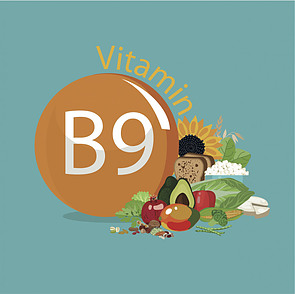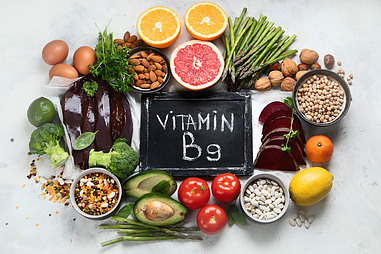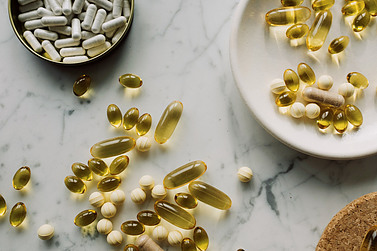Signs and Symptoms of Folate Deficiency to Be Aware Of
Folate is a very important vitamin  nutrient that our bodies rely on for proper functioning.
nutrient that our bodies rely on for proper functioning.
Here we will explore what folate is, the difference between folic acid and folate, signs and symptoms of folate deficiency, foods that are high in folate, and some key considerations when using folate supplements.
What Is Folate?
Folate is one of the 8 B complex vitamins, vitamin B9.
It is water-soluble, which means that it dissolves in water.
It is considered a micronutrient which means that it is needed by the body in small amounts to fulfill its various physiological roles.
The word folate is derived from the Latin word “folium,” which means leaf. This is because many leafy green vegetables are naturally high in this nutrient.
The recommended daily amount of folate for adults is around 400 micrograms per day.
Folate supplements, discussed further below, are often measured in “dietary folate equivalents” or DFE.
The body does store some folate, but only small amounts, so acquiring enough folate via diet is important.
Furthermore, the probiotics found in the gut actually produce folate, which is super cool :).
The main functions of vitamin B9/folate are:
- Energy production
- Cell division and growth
- Production of red blood cells
- Fetal growth and development (such as proper formation and development of the spinal cord and brain)
- Formation of DNA and RNA
- Metabolism of amino acids (the building blocks of protein) and neurotransmitters
- Methylation
The need for folate is increased during pregnancy, because folate plays such a critical role in fetal growth and development. This is why you will often see folate as a top ingredient in many prenatal nutritional products. The recommended daily amount of folate for pregnant women is 600 micrograms.
Folate is also a key player is the methylation cycle, which is an imperative series of physiological processes that involve neurotransmitter metabolism, detoxification, glutathione production, hormone balance, DNA expression, protein synthesis, energy production, and much more.

The Difference Between Folic Acid and Folate
Oftentimes, “folic acid” and “folate” are used interchangeably, however they are not the same thing.
Folic acid is the inactive synthetic form of folate, also called pteroylmonoglutamic acid. This form is used in synthetic supplements as well as in fortified processed food products such as flour and cereals.
The body must put forth more effort to metabolize this form of B9 into its active form so that it may be utilized. This can then lead to a build up of unmetabolized folic acid in the body.
Folate is the naturally occurring form of vitamin B9 found in whole foods. This form is converted via the digestive system into its active usable form, called methylfolate.
The body is better able to convert this form than it is the synthetic form.
Genetics play a large role in our ability to properly convert folate, as there are several common gene variants along the methylation pathway, such as MTHFR, which can reduce one’s ability to convert folate by as much as 70%.
Signs and Symptoms of Folate Deficiency
Signs and symptoms that can be indicative of a folate deficiency include:
- Chronic fatigue
- Anemia – specifically “megaloblastic anemia” which is when your red blood cells are too large due to a lack of vitamin B12 or vitamin B9/folate. Red blood cells decrease in size as they mature, and an adequate amount of these B vitamins is needed for this process to occur properly – symptoms of anemia include fatigue, pale skin, hair loss, shortness of breath, feeling weak, difficulty concentrating, dizziness, headaches, heart palpitations, and more
- Mouth sores
- Swollen tongue
- Numbness and/or tingling in the hands and feet
- Anxiety
- Depression
- Muscle weakness
- Early greying of the hair
- Reduced sense of taste
- Diarrhea
- Abdominal pain
- Digestive upset
- Weight loss
- High levels of the amino acid homocysteine in the blood
Prolonged folate deficiency can contribute to a number of medical conditions which include:
- Heart disease
- Stroke
- Alzheimer’s and Dementia
- Birth defects
Foods High in Folate
Making sure to include plenty of foods that are naturally high in folate is important to ensure that you are acquiring sufficient amounts of this vital nutrient.
Foods high in folate include:
- Asparagus
- Brussels sprouts
- Dark leafy greens such as kale, spinach, mustard greens, arugula, and collard greens
- Broccoli
- Beets
- Eggs
- Beans/legumes such as kidney beans and lentils
- Nuts and seeds such as sunflower seeds, pumpkin seeds, and almonds
- Citrus fruits such as lemons and limes
- Avocado
- Bananas
- Papaya
- Organ meats such as beef liver
One way I like to acquire lots of daily folate is by making fresh vegetable juices with high folate foods such as leafy greens, beets, lemon or lime.
I also use these high quality green juice powders on days when I’m unable to make fresh juice.
The vegetables included above are super easy to include with your daily meals. I usually just saute asparagus, brussels sprouts, broccoli, and/or greens such as spinach with a little olive oil, coconut oil, fresh spices (such as basil, sage, thyme, or rosemary), fresh lemon juice, sea salt, and pepper and it’s a delicious and nutritious addition to any meal.
These vegetables can all also be easily baked.
You can also add fresh avocado to your salads or slide it up as an easy side item with eggs in the morning.

Key Considerations When Supplementing
If you choose to use a folate supplement, there are a few key considerations to be aware of first.
Firstly, you will find both folic acid supplements and folate supplements. Folic acid, as mentioned above, is the inactive synthetic form of folate which ideally should not be used, as it is not as readily utilized by the body and can cause unmetabolized folic acid to build up.
Folate supplements, particularly active folate, called methylfolate (which is short of 5-methyltetrahydrofolate/5-MTHF), are much easier for the body to utilize, as they do not have to go through a process called methylation to be converted into their active form in the body.
These are typically the best form of folate supplement to use.
There is another caveat, however.
Those with common expressive gene variants such as MTHFR and other clinically significant gene variants along the methylation pathway have a reduced ability to convert folate to its active form, methylfolate, so they often have a need to supplement to make up for deficiencies this can cause.
However, those with these gene variants can also exhibit sensitives when supplementing with methylfolate and experience side effects such as anxiety, insomnia, aching joints, nausea, headaches, and more.
This is a catch 22 because there is a need for active folate due to the deficiencies that these gene variants can cause, however when you supplement with this nutrient, you experience side effects.
Depending on many unique, varying factors such as current health status (such as having high systemic inflammation present), your unique collection of other expressive gene variants, health history, and more, you may experience such sensitivities and side effects.
If this is the case, you can work with your doctor to determine a dose that is right for you. You may also need to shelf methylfolate for the time being while some other healing bases are covered. Furthermore, you can also try tapering up very slowly with your dose to determine if this gradual method works better.
Personally, I have had to only use whole food folate supplements because I am still too sensitive to methylfolate supplements. If I take even a very small amount, such as 50 to 100 mcg, I will experience increased anxiety and insomnia.
As my body continues to balance, I will investigate how I respond at a later time.
Furthermore, if you are taking folate supplements, it is often best to supplement with the other B complex vitamins as well, especially vitamin B12, as folate and vitamin B12 have a very close relationship and work together in key ways within the body.

In Closing…
As we’ve explored here, folate is a key nutrient that is required by our bodies to fulfill a number of important physiological functions.
Including plenty of high folate foods in one’s diet is a key part of ensuring optimal health.
REFERENCES